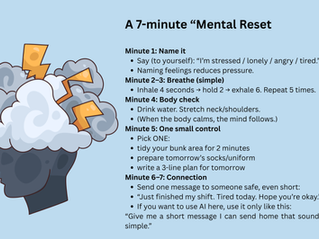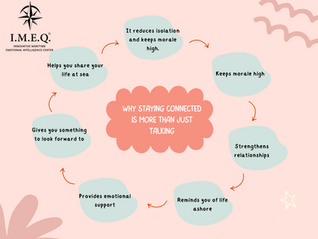Sleep at Sea: The Seafarer's Guide to Restful Nights
- Aug 31, 2023
- 2 min read
Updated: Sep 12, 2023

The challenging nature of maritime professions makes achieving sound sleep crucial yet elusive. Amid the unusual working hours and constant ship noises, sleep is more than just a resting phase; it's a nececity for safety, well-being, and optimal functioning. Here's an exploration into why sleep is essential for seafarers and how they can enhance its quality.
Why Seafarers Must Prioritize Sleep:
Ensuring Safety: A rested mind is sharper, reducing risks of accidents and errors. Given the inherent dangers of sea voyages, adequate sleep becomes a safety imperative.
Health Considerations: Sleep acts as the body's natural rejuvenation cycle. Continuous sleep deficits can result in health issues like obesity, lowered immunity, and heart-related problems.
Mental Equilibrium: Sound sleep acts as a buffer against the challenges of stress, anxiety, and depression. It's a cornerstone for the psychological well-being of sailors.
Peak Performance: Efficient task execution and reduced mistakes are hallmarks of a well-rested seafarer, contributing to the ship's seamless functioning.

Strategies for Better Sleep Onboard:
Maintain Regularity: Endeavor to sleep at similar times, even amidst varying shifts. A habitual sleep pattern bolsters the body's natural circadian rhythm.
Optimal Sleeping Conditions:
Use sleep masks or blinds to achieve a dark cabin.
Employ earplugs to mute external noises, promoting undisturbed sleep.
Minimize Digital Exposure: Electronic devices emit blue light, disrupting sleep-inducing hormones like melatonin. It's wise to disconnect from screens about an hour before bedtime.
Dodge Heavy Foods and Stimulants: Evade consuming large meals and caffeine-rich products before sleeping, as they can disrupt the sleep cycle.
Physical Activity: Engage in regular exercises. While they facilitate better sleep, it's best not to indulge in vigorous activity right before bedtime.
Sleep-Inducing Exercises:
Focused Breathing: Engage in deep, rhythmic breathing, counting to four during each inhalation and exhalation. This practice can induce calmness.
Muscle Relaxation Technique: Intentionally tense and then relax muscle groups, progressing from the feet upwards. This helps in pinpointing and easing muscle tension.
Mindful Visualization: Envision serene places or scenarios. By immersing in the tranquillity of such visualizations, you can divert attention from daily pressures.
Guided Meditation: Use audio resources or apps that direct you through relaxation narratives. These can be especially effective in the unique maritime context.
Restorative Yoga Pose: Lie flat with your legs elevated against a wall or the bed's headboard. This yoga pose aids in relaxation and muscle recovery.
To wrap up, for those charting the vast expanses of the seas, sleep isn't merely about recovering from fatigue; it's a vital compass for overall well-being. By integrating the highlighted strategies and exercises, seafarers can aspire for tranquil nights, setting the stage for safer and more productive voyages.
contact us for more: pmh@imeq-center.com





































































































Comments